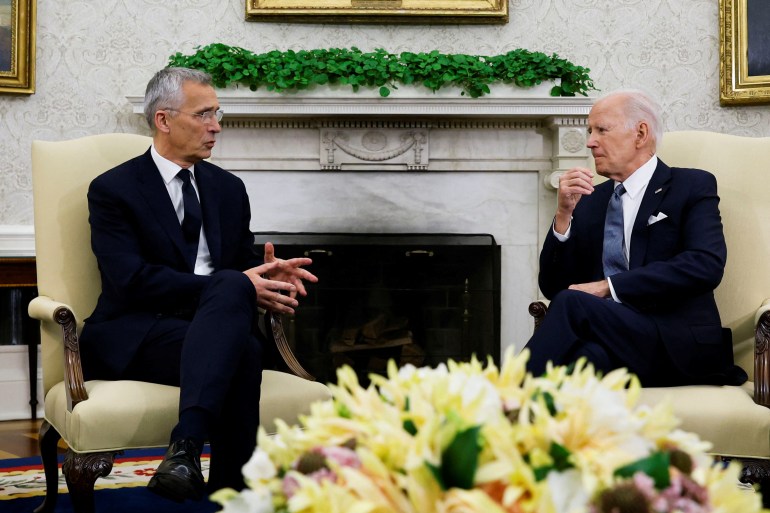Stoltenberg, who is set to step down as secretary general in September, said the NATO alliance would work “to sustain and step up support for Ukraine” and “further strengthen our deterrence on defence” at the Vilnius meeting.
He also underscored the need to send a strong message to Russian President Vladimir Putin, who has championed his country’s full-scale invasion of Ukraine since its launch in February 2022.
“It was not only an attack on Ukraine but also on our core values and on free people everywhere,” Stoltenberg said on Tuesday as he sat across from US President Joe Biden.
“And therefore President Putin must not win this war because that will not only be a tragedy for Ukrainians but also make the world more dangerous. It will send a message to authoritarian leaders all over the world, also in China, that when they use military force, they get what they want.”
Other priorities for the Vilnius summit, set for July 11 and 12, include a stronger partnership with countries in the Indo-Pacific region. In his comments on Tuesday, Stoltenberg also said he would push NATO allies to fulfil a 2006 pledge to commit two percent of their gross domestic products (GDPs) to defence spending — a pledge that many of the 31 member nations have fallen short of in the years since.
“I expect allies to agree that two percent of GDP for defence should be a minimum that we should all invest in our defence, in our collective security,” Stoltenberg said.

Reunion with Biden
Tuesday’s meeting came a day later than scheduled, after Biden had an unexpected root canal on Monday, forcing the 80-year-old president to postpone several White House appointments.
It is Biden’s fourth meeting with the NATO chief, a Norwegian politician and former prime minister who assumed the role in 2014. Anticipating Stoltenberg’s departure, Biden congratulated him on his tenure with the military alliance, which the NATO member states extended three times.
“I think you’ve done an incredible job,” Biden told Stoltenberg. “NATO allies have never been more united. We both worked like hell to make sure that happened. And so far, so good.”
“We’ve strengthened NATO’s eastern flank, made it clear that we will defend every inch of NATO territory,” Biden continued.
He also referenced a key tenet of the North Atlantic Treaty, NATO’s founding document: Article 5, which establishes that, if one NATO ally is attacked, it will be considered an assault on the alliance as a whole. Biden emphasised that provision is ironclad.
“I say it again,” Biden said. “The commitment of the United States to NATO with Article 5 is rock-solid.”
New US assistance for Ukraine
Earlier in the day, the Biden administration announced a new security assistance package for Ukraine, its 40th use of presidential “drawdown” authority to garner equipment from the US Department of Defense.
The package, worth $325m, included arms and equipment like artillery rounds, anti-tank weapons and ammunition for High Mobility Artillery Rocket Systems (HIMARS).
Tuesday’s assistance coincided with a newly-launched counteroffensive effort by Ukrainian forces as they attempt to expel Russian military members from their territory.
So far, gains have been modest, but Stoltenberg voiced optimism towards the efforts in his remarks from the White House. “The offensive is launched and Ukrainians are making progress, making advances,” Stoltenberg said.
“It’s still early days, but what we do know is the more land that Ukrainians are able to liberate, the stronger hand they will have at the negotiating table. And also the more likely it will be that President Putin, at some stage, will understand that he will never win this war of aggression on the battlefield.”
Support for Sweden at NATO
The war in Ukraine has also increased pressure to boost NATO’s membership, with both Biden and Stoltenberg indicating their support on Tuesday for welcoming Sweden into the military alliance.
Sweden is one of only five European Union members that are not a part of the NATO alliance. A bastion of military neutrality for nearly 200 years, Sweden has moved to join NATO amid rising fears of Russian aggression in the wake of the Ukraine invasion.
Sweden’s Nordic neighbour, Finland, became the 31st member of NATO in April, overcoming objections from Turkey and Hungary.
Though Sweden submitted its application to the alliance at the same time as Finland, it has faced more entrenched opposition from Turkey, which has accused the northern European country of harbouring “terrorists” from the outlawed Kurdistan Workers’ Party.
Negotiations further stalled when, in January, protesters in the Swedish capital Stockholm burned a copy of the Quran and hanged an effigy of Turkey’s President Recep Tayyip Erdoğan. Turkey slammed the incident as evidence of Islamophobia. Swedish officials, meanwhile, have denounced the protests but said they were shielded under the country’s free-speech protections.
Nevertheless, Stoltenberg struck a positive note when addressing Sweden’s possible accession to NATO on Tuesday. He has previously pushed Turkey to overcome its objections.
“We’ll all look forward to welcoming Sweden as a full-fledged member of the alliance as soon as possible,” Stoltenberg said.
Biden echoed that assessment, taking the opportunity to also criticise his Russian counterpart. “Putin is making a mistake even looking for the Finlandisation of NATO,” Biden said, referring to efforts to make the NATO allies neutral on military matters, like Finland once was.
He added: “You’ve got the NATO-isation of Finland and hopefully Sweden shortly.”
